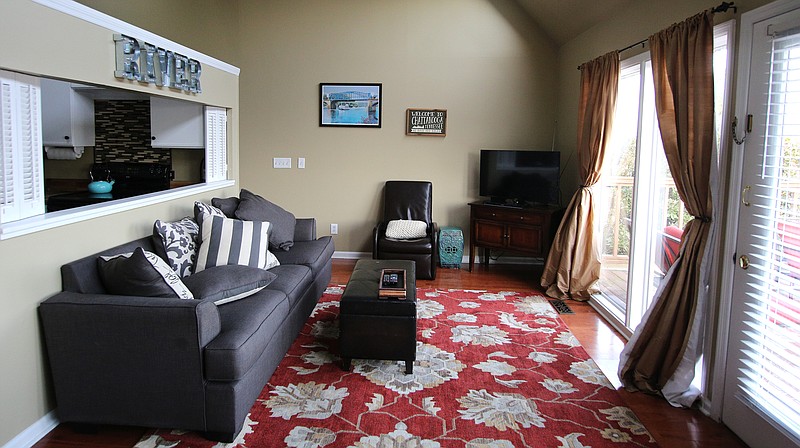When Christina and Christian Thoreson take on a new short-term vacation home to manage in the Chattanooga area, they don't do so lightly.
With 25 properties under their wing and a company name to protect, they hold their homes to higher standards than most in terms of cleanliness, amenities and location, they said. After all, they've been doing this for 14 years and have learned a few things, like sometimes people steal hair dryers and always make sure to have a tea kettle available for British guests.
Christina and Christian, who goes by "Thor," have made a living from managing the 25 properties through their business, Chattanooga Vacation Rentals, with two of those properties being their own. In one year, just one of their owned properties brought in $32,000, Thor said.
While the couple said they post their properties on more than 100 websites around the world and in more than 40 languages, there's no doubt that the vacation rental website Airbnb has helped elevate their business in recent years. According to the city of Chattanooga, there are nearly 178 approved short-term vacation rentals, or STVRs, here, with many concentrated in neighborhoods surrounding downtown including St. Elmo, the North Shore, and Lookout Mountain.
Airbnb figures released this week show Chattanooga-area hosts earned around $11 million in supplemental income in 2018 and had about 110,000 guest reservations to the region, which includes Hamilton, Bradley, Grundy, Marion, Polk, Rhea, Sequatchie, McMinn, Bledsoe and Meigs counties.
Hamilton County brought in the largest chunk of that with $9.7 million. A typical Airbnb host earns $9,300 a year in supplemental income, according to the company.
Airbnb company officials did not respond to requests for numbers from previous years to compare. The Times Free Press has reported that in 2017, some 53,000 people visiting Chattanooga booked rooms through Airbnb, earning local hosts some $5.2 million. That's compared to 24,600 guests and $2.5 million in 2016.
In 2018, North Georgia Airbnb hosts in Dade, Chattooga, Walker, Gordon, Catoosa, Whitfield and Murray counties brought in around $971,000 and saw 9,700 reservations.
While there were other home-sharing sites out there far before Airbnb, such as VRBO and HomeAway, Thor said Airbnb was a "disruptor."
"They exposed home-sharing to the world and to where anyone could do it," he said.
But Airbnb has raised some problems for municipalities, including Chattanooga. While the Thoresons said they have always paid taxes on their rentals, some area hosts who have been using Airbnb in recent years haven't been paying taxes to the city and county. This past year, state, Chattanooga and Hamilton County officials reached agreements with Airbnb for the internet company to begin collecting taxes from its hosts.
Out of the more than $8.1 million Hamilton County collected in occupancy tax from January to December in 2018, about $73,200 was collected from Airbnbs in the county from October to December, according to the Hamilton County Trustee's Office. The county didn't start collecting taxes from Airbnb hosts until October, and December figures are still rolling in so those figures could increase.
In a statement, Airbnb said continued growth in the hotel industry shows home-sharing complements rather than competes with hotels. They cite a Mid-South hotel report from the real estate investment firm Marcus and Millichap that states "rising hotel revenue and higher first-year returns than many gateway markets continue to spur demand for hotels from both local and out-of-region buyers in the Mid South."
Barry White, president and CEO of the Chattanooga Convention and Visitors Bureau, said Airbnbs and other vacation rentals can supplement the growing number of hotels in the city. In 2018, 10 hotel projects were proposed, under construction or opened in downtown Chattanooga.
"The way I view it is it provides additional options and additional price points for people to consider when they are coming to Chattanooga and Hamilton County," White said.
For one night in the "River Lights" condominium the Thoresons manage downtown, six people can comfortably sleep for $198.
The couple said they made a "conscious decision" to not put their properties on Airbnb for the first eight years of the company's existence as they saw the company feuding with state and local governments over regulations and taxation.
"They've lost battles in a lot of states because they've had that arrogant attitude," Christina said.
Then, they started to see a shift in Airbnb's model. The company moved up from just renting out rooms and apartments to renting out entire houses. They made a commitment to be more inclusive for hosts and guests and started working with states on regulations.
"What Airbnb has done is created a situation to make it more electronically friendly, and they really pushed that e-commerce side," Christina explained.
The couple said most of the visitors who stay with them are between 45 and 55 and come with their kids or grandkids. More than 80 percent come from a two-hour drive away or closer, and they think they cater to a much different clientele than hotels that might benefit more from couples or business travelers.
"It doesn't really compete with hotels because it's not the same paradigm," Christina said. "We've met hotel association people who loved short-term vacation rentals - that's not true of every city."
THE AIRBNB CONTROVERSY
The Thoresons label their properties with names that would intrigue any type of traveler - from the rugged outdoorsmen and women to the urban dwellers looking for a music venue and cocktail or two.
The pet-friendly "Chattabox" in historic St. Elmo is within walking distance to restaurants, coffee roasters and pubs. "The Windsong Chalet" promises a five-acre, wooded getaway in Flintstone, Georgia, with a hot tub that's pet friendly.
The No. 1 question they get from everyone who calls is, "How far away is Rock City?"
Sitting at the table in their River Lights property that they manage, Thor explained why short-term vacation rentals could be a contentious topic for some locals.
"I understand them not wanting short-term, transient people in the neighborhood," Thor said. "On the other hand, people should be able to use their property however they want to."
He makes the point that a long-term renter in a neighborhood who is not courteous might be worse than someone who is just visiting for a few days.
In 2017, the city approved a new ordinance regulating short-term vacation rentals in the city that Christina and Thor helped shape. Before the 2017 change, many Airbnb hosts within Chattanooga were operating illegally, and that's because the rentals were only allowed within two city zoning categories: R-3, a high-density, multifamily category with lots of freedom some have called the "Wild West" of zoning, and R-4, which allows office and multifamily residential use.
People who sought R-3 zoning from the Chattanooga-Hamilton County Regional Planning Commission and Chattanooga City Council to use their property for short-term vacation rentals were often shot down, usually because neighbors opposed the rezoning and not the Airbnb. Enforcement of illegally run Airbnbs was almost non-existent unless a neighbor complained.
While the new ordinance now allows short-term vacation rentals in R-1 and R-2 zoning areas, many residents in neighborhoods with several of them have stated they contribute to rising housing costs, diminish the fabric of neighborhoods and can lead to vandalism by renters and also locals who know they are not always occupied. Most of the rentals in Chattanooga are non-owner occupied.
Christina said people who stay in vacation rentals tend to spend twice as much in the community during their stays than when they stay in hotels. The occupancy rate for the properties she and her husband manage is usually around 64 percent, she said, compared to the national average of 38 percent.
Christina and Thor said they have offered advice and help to other vacation rental hosts in the area, because one competitor making a bad name for themselves could bring down the entire industry.
"We care deeply about Chattanooga," Christina said.
Thor added they were hesitant to manage or own any rentals within the city limits of Chattanooga for several years. Right now, they still only have three in the city, with all of the others within Hamilton County or other surrounding counties.
"We are not highly invested in the city right now," Thor said. "We are watching to see where things go."
Contact staff writer Allison Shirk Collins at ashirk@timesfreepress.com, @AllisonSCollins or 423-757-6651.

